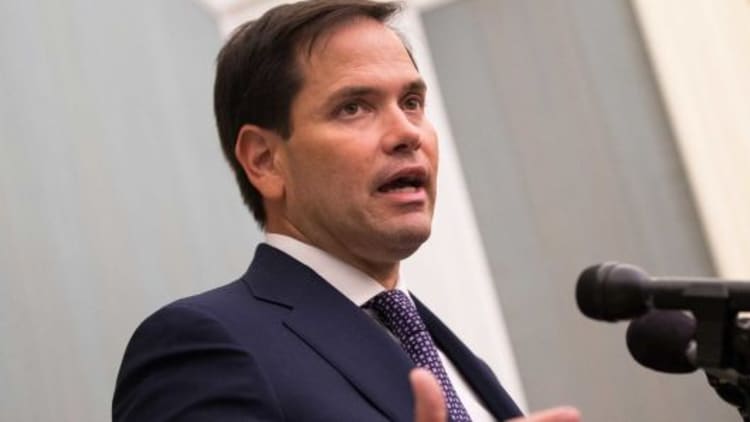
Republican Sen. Marco Rubio is pushing a new proposal that tackles one of Democrats' favorite talking points: stock buybacks.
The plan, unveiled Tuesday, would eliminate the preferential tax treatment of share repurchases as a way to discourage that behavior. Instead of falling under the capital gains rate, they would be taxed as dividends, which are subject to a wide range of rates.
Rubio is the chairman of the Small Business Committee, which is releasing a report on the issue today. It argues equal rates would remove companies' incentives to buy back stock in the first place.
"Tax policy changes to end this preference might, on their own, increase investment by shifting shareholder appetite for capital return," the report states.
WATCH: Tax the rich: What Democrats' plans could mean for growth and inequality

Under the plan, any money spent by companies on buybacks would be considered, for tax purposes, a dividend paid to shareholders — even if investors did not actually sell their stock. Every shareholder would receive an imputed portion of the funds equivalent to the percentage of company stock they own.
Rubio expects the change would likely result in fewer companies pursuing buybacks. But if they do, the proposal could raise tax revenue in two ways: It broadens the base by increasing the funds that can be taxed, and it could result in higher tax rates if shareholders are subject to ordinary dividend rates instead of qualified dividends.
Rubio's staff said his intent is not to raise rates but acknowledged that more details need to be worked out before formal legislative text is introduced.
The report suggests that any revenue generated from the change could be funneled into encouraging more capital investment. The current tax law — passed by Republicans in 2017 with Rubio's reluctant support — allows businesses to fully and immediately deduct their expenses, but the popular provision phases out after 2022. The new proposal would make that measure permanent and expand the types of investments eligible for the deduction.
The report calls the Tax Cuts and Jobs Act a "missed opportunity."
"The existence of non-productive alternatives to capital investment, as a result, makes the product of the firm's American workers less valuable while at the same time increasing profits, making possible a world of higher asset prices, lower investment in the economy, and lower worker pay," it states.
The measure aligns Rubio with Democrats who have argued that the benefits of the GOP's tax law have primarily benefited corporations rather than households. The message has become a central theme for the early presidential contenders for 2020 — and a narrative that Republicans have fiercely resisted.
But Rubio was a GOP outlier during the debate over the tax law, arguing for a slightly higher corporate tax rate to offset the cost of a bigger child tax credit. Since then, he has repeatedly highlighted the relatively slow growth in wages to the massive jump in share repurchases.
"When corporation uses profits for stock buy back it's deciding that returning capital to shareholders is better for business than investing in their products or workers," he tweeted in December. "Tax code encourages this."
The tweet highlights Rubio's key philosophical difference with Democrats. Rather than blame companies for reaping the benefits of the law, the report suggests they are merely reacting to poor incentives.
"If there is a problem with the raising and deploying of capital, then, it is not attributable to the firm's response to its governors, but rather the terms upon which governance is set," it states.

